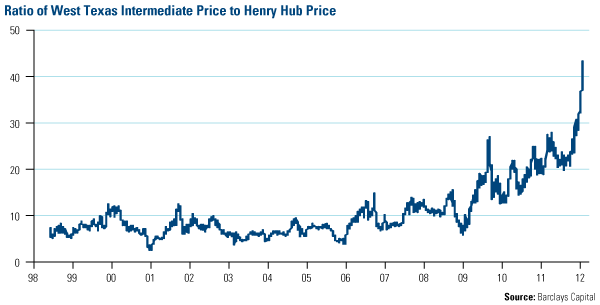Energy and Natural Resources Market Radar (January 23, 2012)

Strengths
- The Global Resources Fund performance over the last week has bested its benchmark largely through stock selection in the energy sector and specifically in the oil services and equipment area.
- Barclay’s capital highlighted that base metals have started the year with a “bang;” prices are up on average 11 percent since the start of the year making it the best-performing sector so far. Copper gained approximately 10 percent for the week.
- One of the key leading indicators of U.S. non-residential construction, the American Institute of Architects Billings Index, remained above 50 in December, representing an increase in the month.
- Consultancy Steel and Metal Market Research said this week global crude stainless steel production hit a new record high of 35.5 million tons in 2011, but the pace of growth was slower than the previous year.
- Freeport McMoRan has resumed copper concentrate shipments from its Grasberg copper-gold mine in Indonesia, which had recently only resumed work from a three-month strike ending in December. Freeport is the world’s second-largest copper mine and supplied the global market with nearly 2.5 percent of the global demand.
Weaknesses
- After another soft reading of the weekly storage withdrawal, natural gas prices tumbled further this week as warmer than normal weather curbs demand. Natural gas futures fell 12 percent this week to close at $2.35 per mmbtu.
- Total steel shipments rose just 5 percent year-over-year for their smallest increase in nearly two years. Shipments fell 14.7 percent month-over-month on a days-adjusted basis, while total steel inventories rose 3.1 percent month-over-month and 8.3 percent year-over-year.
- According to Deutsche Bank, Norsk Hydro, the world's fifth-largest primary aluminum producer with market share of nearly 4 percent, has confirmed that it will close one of the three potlines at its 180,000 tons per annum Kurri Kurri smelter in Australia in response to the price weakness of recent months. Rio Tinto and Alcoa, the world's second- and third-largest producers, have also announced plans to close some capacity.
- ArcelorMittal will extend the closure of it Sestao plant in Spain as it does not expect southern European steel demand to improve in the near future, it said. The company had announced last October that it would halt steel production at the Sestao plant in November and December. "ArcelorMittal Sestao will restart operation as soon as market conditions turn around," a spokesperson said in an e-mailed statement.
Opportunities
- Deutsche Bank highlighted that the International Energy Agency (IEA) said that China’s oil-product consumption is expected to rise 400,000 barrels per day to 9.9 million barrels per day in 2012, almost 40 percent of the increase in global consumption. According to its forecast, global crude oil consumption is expected to increase 1.1 million barrels per day to 90 million barrels per day.
- BP Plc said that China will drive the world’s growth in oil demand in the next 20 years and in 2027 will overtake the United States as the world’s top oil consumer.
- Deutsche Bank reported that Japan’s largest copper smelter suspended its Saganoseki smelter operation, with an annual capacity of 200 000 tons, due to fire damage. On top of this, Philippine’s PASAR copper smelter is also facing production problems. On the back of production disruptions, London Metal Exchange (LME) copper cancelled warrants increased significantly from New Orleans, where more free copper units exist globally.
- Freeport McMoRan reported that downstream demand in the U.S. is positive and project a tight and encouraging copper market in 2012, with the auto sector strong and signs of improvement in construction.
- U.S. service center steel inventories rose 3 percent month-over-month for December and were still 18.7 percent below average historical levels. December inventories were 52.8 percent below peak levels and 42.5 percent above trough levels. Inventory restocking likely has helped boost steel prices in recent months.
Threats
- Nigeria’s government ordered a fresh audit of its entire oil and gas sector covering the last three years. This move follows the opening of an investigation into the sector by the corruption watchdog and a separate Senate investigation into fuel subsidies - all announced this week. In response to a reduction in fuel subsidies, the country has witnessed a country-wide strike threatening the gas and oil sector.
- Crude oil is the most vulnerable to near-term supply disruption from geopolitical tensions. The sustainability of commodity supply is being challenged by rising state political interference and local self-interests that is delaying and constraining the resource development needed to meet emerging demand growth.










